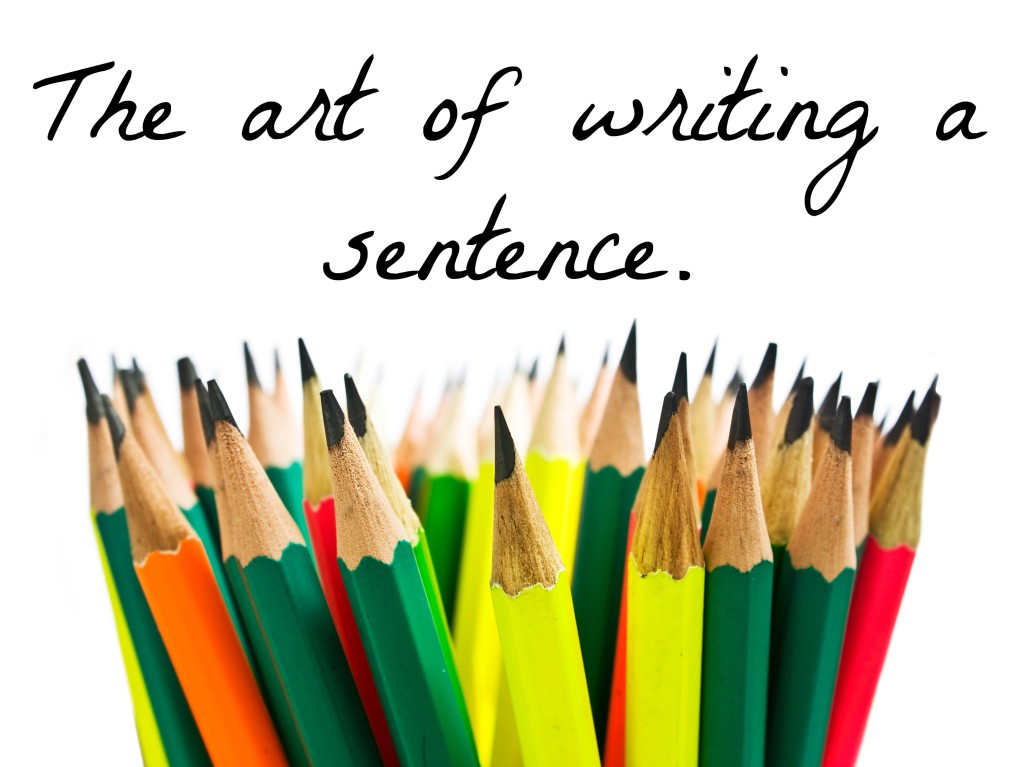Writing is, of course, composed of sentences. Stringing words together in a particular order conveys meaning so that we can relate to one another and communicate, and it is as simple (or complex… or compound… or compound-complex!) as that. Today we’re going to look at the different kinds of sentences.
Every sentence contains a subject and a verb (if a sentence doesn’t contain a subject and a verb, it ceases to be a sentence and is instead a phrase). The subject in the sentence describes the who or the what. It is frequently a noun (which is a person, place, or thing). The verb in the sentence describes what is happening or it links the subject to another word. In the sentence “Jane ate,” Jane is the subject and ate is the verb. However, if the sentence instead reads “Jane is eating,” then Jane remains the subject, but is becomes the linking verb. This also means that the linking verb indicates the tense; Jane either already ate in the past or she is eating right now in the present.
Sentences are either active or passive. In an active sentence, the subject performs the action of the verb; in a passive sentence, the subject receives the action of the verb. “Jane ate an apple” is an example of an active sentence. “The apple was eaten by Jane” is an example of a passive sentence. We are encouraged to most often write in the active voice as it tends to be more interesting for the reader, and also because it reads more clearly.
There are four kinds of sentences:
1. Simple sentence: contains one independent clause (a subject-verb combination), so there is one subject and one verb.
2. Compound sentence: contains at least two independent clauses which are linked by one of the following seven coordinators: and, or, but, nor, yet, for, or so. That means that a compound sentence is two simple sentences strung together.
3. Complex sentence: contains an independent clause plus at least one subordinate (or dependent) clause. There are dozens of subordinate clauses, but a few of them include when, until, after, because, and which. Therefore, a complex sentence is a simple sentence with an explanation or more complex description.
4. Compound-complex sentence: contains at least two independent clauses and at least one subordinate clause.
A word of caution
Beware of run-on sentences! Although it’s fun to play around with different lengths of the different kinds of sentences listed above, it is not necessary to carry on line after line without taking a breath. Shorter, snappier sentences are easier to read and they get the point across quicker. This makes our brains do less work while still receiving the same amount of information.
So why use it?
If you don’t use sentences, you’ll probably have rather a lot of difficulty in getting yourself understood! Besides the importance of communication, knowing how to write a good sentence can be useful in all manner of business and public relations. Poor sentence structure tends to be associated with being uneducated and can severely undermine your prospects for progressing and succeeding in our society.
To be taken more seriously and to be viewed as a professional, pay attention to how you write your sentences. Are you conveying the information that you intend? Is your meaning getting across to others? These questions are vital to ask. When you vary your writing and use different kinds of sentences, you also have a better chance of engaging with and appealing to your reader.

The advantage I have in bog world is I don’t have to follow all the rules that restricted me in my formal education and writing. Now I can write for effect. To convey a feeling. To drop a participle 🙂
You are so right. I’d recommend Churchill’s ‘My Early Life’ if you haven’t read it. He was a true master of the art of pithy sentences. (It’s also a great story). Dickens on the other hand could keep a sentence going for pages and still be clear. But short is usually best I reckon 🙂
Dr. J- I agree, blog writing allows for much more freedom in that respect.
Liz- Thanks for the recommendation! I’ll look into it.
[…] Image Source: Sagan Morrow […]